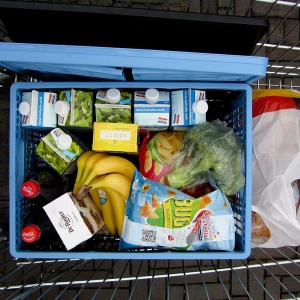
This paper by FCRN member Claire Pulker of Curtin University analyses the presence and quality of supermarket corporate social responsibility (CSR) policies related to all attributes of public health nutrition, including sustainability. The paper audited Australian supermarket own brand foods to establish the extent to which CSR policies are translated into practice.
The paper finds that fifty-one CSR policies that can impact public health nutrition were made by three Australian supermarket chains. Over half (61%) of the policies related to sustainability (e.g. setting animal welfare standards, or ethical sourcing of specific ingredients), with few aimed at making nutritious foods accessible (2%) or affordable (4%), and none relating to making nutritious foods available (see Table 1 of the paper for specific examples of policies).
One limitation of this study was that during audits of 3940 supermarket own brand products, only information from the front of the packs was considered, which means back-of-pack information was excluded. This is because the study was intended to reflect a shopping experience where consumers make decisions quickly instead of consulting back-of-pack information in detail. Furthermore, the information generally found on the back of food packs (such as nutrition information panels and ingredients lists) is typically present regardless of CSR policies.
Pulker told the FCRN: “Corporations, such as supermarkets, have been charged with contributing to improving population diets and the sustainability of food systems, which is particularly important for countries with limited government public health nutrition policy action. However, Australian supermarket CSR policies do not address encouraging healthy and sustainable population diets in a meaningful way.”
Abstract
Improving population diets is a public health priority, and calls have been made for corporations such as supermarkets to contribute. Supermarkets hold a powerful position within the food system, and one source of power is supermarket own brand foods (SOBFs). Many of the world’s largest supermarkets have corporate social responsibility (CSR) policies that can impact public health, but little is known about their quality or practical application. This study examines the nature and quality of Australian supermarkets’ CSR policies that can impact public health nutrition, and provides evidence of practical applications for SOBFs. A content analysis of CSR policies was conducted. Evidence of supermarkets putting CSR policies into practice was derived from observational audits of 3940 SOBFs in three large exemplar supermarkets (Coles, Woolworths, IGA) in Perth, Western Australia (WA). All supermarkets had some CSR policies that could impact public health nutrition; however, over half related to sustainability, and many lacked specificity. All supermarkets sold some nutritious SOBFs, using marketing techniques that made them visible. Findings suggest Australian supermarket CSR policies are not likely to adequately contribute to improving population diets or sustainability of food systems. Setting robust and meaningful targets, and improving transparency and specificity of CSR policies, would improve the nature and quality of supermarket CSR policies and increase the likelihood of a public health benefit.
Reference
Pulker, C.E., Trapp, G.S., Scott, J.A. and Pollard, C.M. (2019). The Nature and Quality of Australian Supermarkets’ Policies that can Impact Public Health Nutrition, and Evidence of their Practical Application: A Cross-Sectional Study. Nutrients 11(4):853.
Read the full paper here. See also the Foodsource What is the nutrition transition?







Post a new comment »